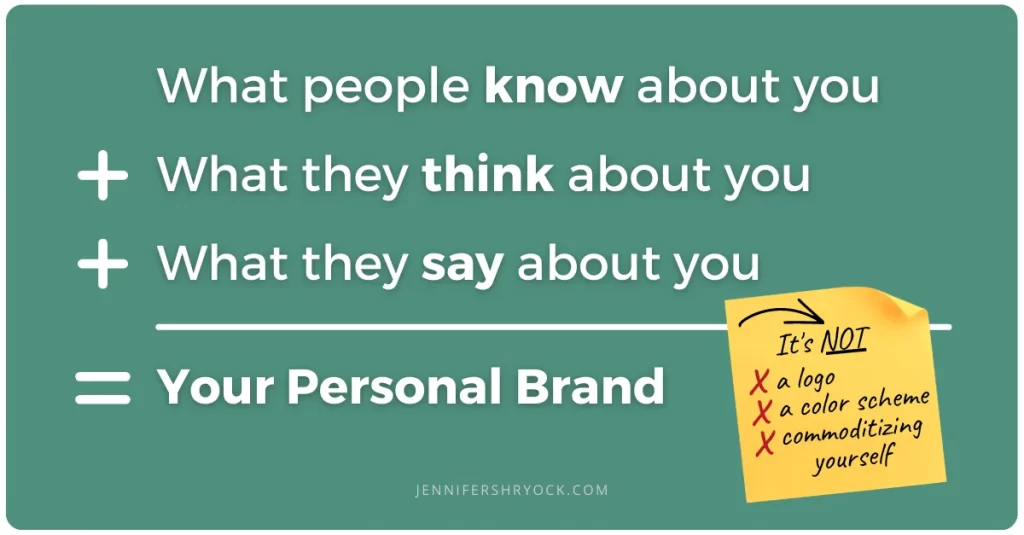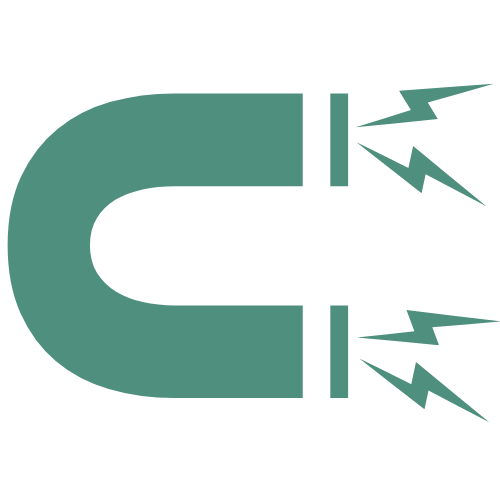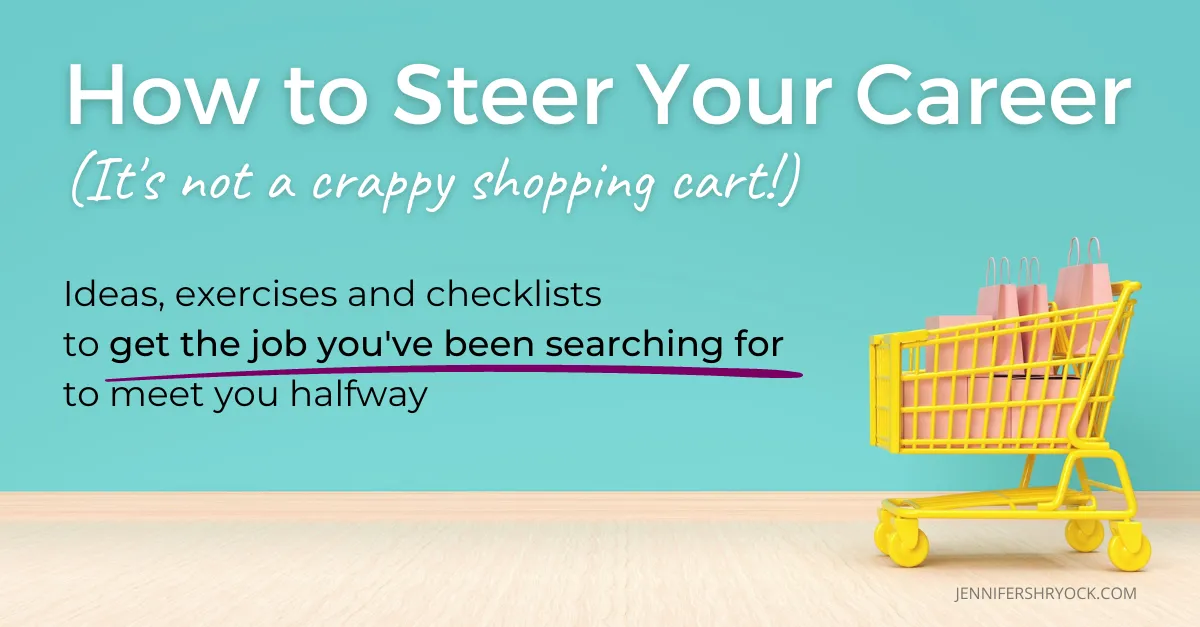TL;DR: Want to steer your career? Your job search will produce more and better opportunities when your friends, family, co-workers, and colleagues — and also your resume, cover letter, references, and interview answers — hold an accurate picture of 1) the value of what you do and 2) what you want to do next.
This happens to everyone eventually: You take the next or nearest shopping cart, start rolling through the store, and suddenly — it has a mind of its own. Oh no. You picked a Crappy Cart.
It pulls left when you point it forward; it puts up a fight when you aim it to the right. So, you crab-walk and get an all-arm workout trying to force the accursed cart to go where you want to be.
You think — you hope — that its wonky wheel will magically fix itself, but it is what it is. Fortunately, you have choices: 1) Get used to a lifetime of left-hand turns or 2) Get another cart.
Many people steer their careers in the same way.
They allow other people, the economy, fate, and luck to choose their career path and they struggle to find the job they want when they could swap their ineffective job search tactics for a job search strategy that steers their career where they want it to go.
Are You Steering Your Career or Being Pulled Off Track?
Are you aiming for—
- Work that’s a better fit and a step beyond?
- More job interviews and better job offers?
- More and better projects and development possibilities?
- A promotion, more autonomy, and better pay?
… and moving steadily in that direction, or do you find yourself over in the produce section when you meant to be in the dairy aisle?
Wherever you’re headed and however far you’ve gone, this article can help:
- If you’re headed in the wrong direction, it will help you get on the right course.
- If you’re headed in your right direction, it can help you arrive sooner with more ease.
Let’s start with this question…
What Are You Known For?
Whether you know it or not — or like it or not — you have a personal brand.
By “personal brand,” I don’t mean a business’s look and logo or commoditizing yourself as celebrities and social media influencers do.
Personal brand is my shorthand for your reputation plus the impression you leave on others with what you say and do. Your personal brand is what people know about you, think about you, and say about you.

You build your personal brand with every human interaction at work, home, and in your community, including—
- Presentations
- Phone calls and text
- Meeting participation
- Casual conversations
- Creative collaborations
- Social media posts
When you interact with others, you discuss issues, interests, and ideas; you express likes and dislikes, share stories, and voice opinions — and of course, you answer the question “What do you do?” and talk about your work.
Throughout these interactions, people’s impressions of you are shaped by how you present yourself and the information you offer, as well as what they believe and imagine.
Wider and deeper than a first impression, your personal brand is built through consistent action over time. It’s the lasting impression that comes to people’s minds and what they discuss with others.
Think On It
Take a moment now to reflect on what people know about you and the impression you may be leaving them with.
- How do people describe you and your work?
- What are you known for?
- Do people call you, refer you, or hire you for the things you love to do?
If what people say and think about you align with what’s true — well done! You have a personal brand that fits.
But if you’re like most people, you’ve unknowingly built a personal brand that doesn’t paint a full or true picture of you, so it’s not serving you as well as it could.
Let’s look at how that absence of intention impacts your job search…
Why Your Job Search Veers Off the Track (or Stalls Out)
In the realm of your job search, a vague or inaccurate personal brand shows up as a LinkedIn profile, resume, cover letter, and interview answers that don’t line up with who you are and what you do or convey the value of your work.
The result? You don’t get called for interviews, your interviews don’t lead to offers, or the offers aren’t as good as they could be — and that’s just how it affects the jobs you know about and apply for.
Since only about 20% of jobs are filled through job postings, your accidental personal brand could be excluding you from the other 80% of your career opportunities.
Within your inner circles, an inaccurate personal brand means your friends, family, co-workers, colleagues and neighbors have vague or incorrect notions about—
- What you do
- The value of what you do
- What you want to do next
When the people in your inner and outer circles are aware of these things, they can be able scouts and eager ambassadors for your job search and steer the right career opportunities your way.
But when they don’t know, they can’t help. As they move among their circles and hear about opportunities, they’ll associate you with the wrong things (or nothing) and steer your job search in unwanted directions (or won’t add a needed push).
Here are sure signs that your personal brand isn’t on point:
- People recommend you for jobs outside your field, skills, experience, or genius
or - People recommend you for jobs far beneath or beyond your abilities or
- People don’t recommend you for jobs at all
That’s frustrating, but you can fix it. Here’s what’s worked for hundreds of my clients…
How to Reshape Your Personal Brand
An untended personal brand is a problem, but it’s also pliable. You influence how people perceive you, your work, and its value, and that can work for you instead of against you.
The same consistent action over time that builds an inaccurate personal brand can be used intentionally to reshape it into a correct impression.
The benefit? As my clients have experienced, a personal brand built on what’s true for you will transform you into a magnet for jobs you’ve been searching for and even opportunities you’ve only dreamed of or hadn’t imagined.
Wouldn’t it feel amazing to hear the job you’ve been hunting for will meet you halfway?
Think On It
The people in your inner circles don’t know what you do or its value because 1) you haven’t told them or 2) you haven’t conveyed it effectively. Perhaps you’re not sure yourself.
Take a moment now to get clear on what you want people to know about you, the impression you want them to have, and what you want them to share with others.
As you consider what you want to be known for, remember:
- The outcomes and results of your work convey its value better than your job title, your responsibilities, the tasks you do, or the time it takes to do them.
- Your personal brand is about presenting the true you, not putting up a false front.
- Who benefits from your work?
- How do they benefit from your work? What do they gain or enjoy through your effort?
- What do you want them to say to others about your work?
Now that you’ve thought about what you are known for and what you want to be known for, explore how you’ll close that gap between the two.
Your Job Search: Closing the Gap
At this moment, you may not be a good fit for the work you want to be known for, or you may not believe you are. If so, then you’ll need to take action that will close the gap between what you have and what you want.
What needs to change to reshape people’s impression of you — your personal brand — into a magnetic asset that brings opportunities your way?
Think On It
- Who do you want to be? How might you conduct yourself to be more like that person and to feel more like that person?
- How might you help others recognize you as the person you want to be and the work you want to be known for?
- What do you want to think about your work? How do you want to feel about your work? What would you like others to think about you and your work?
- Their words matter. What would you like people to say about you and your work?
- Your words matter. When someone asks what you do, what might you say to convey your one-word theme and the value of your work? How might you say it so that it’s memorable, valuable, relatable, and repeatable?
That’s some good thinking! Now let’s put it into action…
Taking the Wheel to Steer Your Career
You have a personal brand, and now that you’ve thought through how to reshape it into one that accurately represents you and will serve you well, here are 10 ways to use it to steer your job search where you want it to go.
Your On-Brand Job Search Starts Here
This is where all my resume clients and community members begin (and end up with jobs they love).
Find a more compelling way to talk about your work:
- Identify the one-word theme or intention of your personal brand, e.g. valuable, simple, memorable.
- Compose a one-line bio that conveys the crux of what you do and why it’s valuable.
Then repeat it:
- Every time someone asks what you do
- At work and away from work
- In your LinkedIn profile and other social media platforms
- On your resume and in your interviews
Repetition of one clear, simple, and memorable description of your work enables others to spread the word about you. Done consistently and over time — alongside your good work and being a good human — more and better opportunities will come your way.
One-Time Actions
One-time actions are set-em-and-forget-em tasks to create signposts and markers that accurately express your personal brand on your behalf.
- Update your personal email address
Sugarbaby034@hotmail.com or kittenlover@aol.com are probably not a part of your professional personal brand 😉 - Add/update your email signature
This is an ideal place for that one-line bio that touches on your value. - Update your social media profile photos and bios
Match your profile photos so it’s easy for people to identify you. Use your one-line bio in your profile description. - Focus the intention of your social media posts, especially on LinkedIn
Share your knowledge, celebrate successes, and offer help. - Level up the look and feel of your resume and LinkedIn profile
Ask others to see if your one-word theme comes across in a 5-second glance
Live Interactions
Online and offline, make the most of interactions with people who can ride shotgun, pave the way, or help drive on long hauls as you steer your career.
- Talk to people in your circles about what you do, its value, and what you want to do next
- Connect with industry peers and people who work at your target companies on LinkedIn, via email, and social media
- Identify possible career mentors and sponsors — people who can help hone and amplify your personal brand, your work, and your network
- Attend workshops, seminars, and conferences and engage with others
- Schedule informational interviews at likely companies and organizations
Recap: Steer Your Career with a Magnetic Personal Brand
- You have a personal brand whether you want one or not.
- A job search without awareness of your personal brand is like trying to steer a wonky-wheeled shopping cart — doomed to frustration and limited to a fraction of what’s possible.
- An inaccurate or unfavorable personal brand harms or stalls your job search.
- Your friends, family, co-workers, and colleagues can be ambassadors and scouts on your job search when they know what you do and its value, and what you want to do next.
- You can intentionally reshape an accidental personal brand into one that benefits you.
- There are 10+ effective ways to express your personal brand — online and off.
- Repeating one clear, simple, and memorable description of your work will do the heavy lifting for you.
- You can engage with people around the things that matter to you to grow your personal brand.
… and remember:
- Set a clear intention or theme that can be the guidepost for your language, actions, and interactions.
- Shaping and reshaping your personal brand happens through consistent action over time. Get clear, stick with it, and be patient.

P.S. Level up your ho-hum elevator pitch into a genuine sentence that’s easy to say — and actually works with my Magnetic One-Liner Workshop. (You can be one step closer to a better job in 60 minutes or less.)


